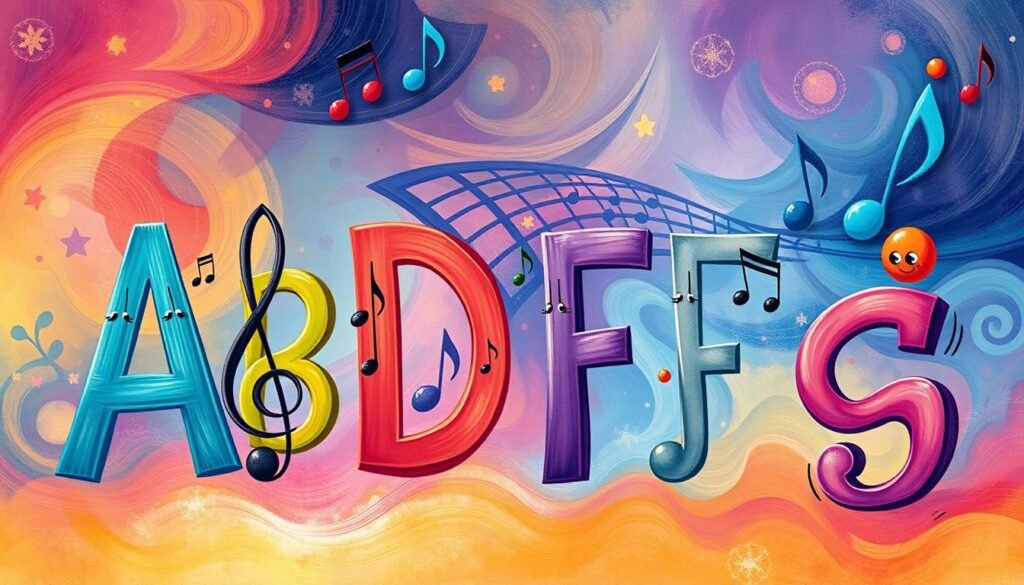Music Theory For Beginners might seem tough at first, but it’s actually quite simple. It’s like learning a new language that makes music more fun. This guide will make music theory easy to understand with simple explanations and examples. It’s perfect for anyone who loves music or wants to learn more about it.
Also Read: Tips For A Long Term Music Career
Key Takeaways
- Music theory is a vital foundation for understanding and appreciating music.
- Learning the basics of music theory can greatly enhance your musical skills and appreciation.
- This guide provides a beginner-friendly approach to understanding the fundamentals of music theory.
- Mastering music theory can unlock new musical possibilities and deepen your connection to the art form.
- By the end of this guide, you’ll have a solid grasp of the essential elements of music theory.
What is Music Theory?
Music theory is the key to understanding music’s inner workings. It’s essential for musicians, composers, and fans. It helps us create, interpret, and enjoy music. By learning it, you’ll see how melodies, harmonies, and rhythms blend into the music we adore.
Also Read: Top Music Universities For World Music
The Importance of Music Theory
Learning music theory has many benefits for your musical journey. It lets you talk with other musicians using a common language. It also boosts your skills in composing music, making your pieces more complex and rich.
Knowing music theory makes you appreciate music more. You’ll notice the elements that make music special. This knowledge is valuable for everyone, from beginners to pros.
Understanding music theory opens up new musical possibilities. Mastering its basics lets you fully explore what is music theory and the benefits of learning music theory.
“Music theory is the foundation upon which all great music is built. It’s the language we use to communicate our musical ideas and emotions.”
Also Read: How To Make Money In A Music Career?
The Musical Alphabet and Notes

Music has its own special letters that form the base of all songs. The musical alphabet includes seven notes: A, B, C, D, E, F, and G. These notes go around in a circle, making up the basics of notes and pitch.
Knowing the musical alphabet is key to reading music. Each note has a specific pitch, which tells us if a sound is high or low. This knowledge helps musicians understand melody, harmony, and rhythm. It makes them better at making and enjoying music.
| Note | Pitch |
|---|---|
| A | Low |
| B | Medium |
| C | High |
| D | Medium |
| E | Medium |
| F | High |
| G | Medium |
Octaves are the gaps between two notes with the same name but different pitches. Getting octaves is key to the musical alphabet and deep music appreciation.
Also Read: Exploring Music University Student Life
“Music is the universal language of mankind.” – Henry Wadsworth Longfellow
Scales: The Building Blocks of Music

In the world of music, musical scales are key to creating melodies, harmonies, and the feel of a piece. They are vital for composers, improvisers, and musicians. They help explore the vast musical world.
The Major Scale
The major scale is a common pattern in music. The C major scale includes the notes C, D, E, F, G, A, and B. It has a specific sequence of whole and half steps. This makes the C major scale sound bright and cheerful, used in many types of music.
Learning the major scale is important for music theory. It helps musicians compose, improvise, and adapt to different styles and moods.
Also Read: How To Build A Music Career?
| Scale | Notes | Interval Pattern |
|---|---|---|
| C Major | C, D, E, F, G, A, B | Whole, Whole, Half, Whole, Whole, Whole, Half |
| G Major | G, A, B, C, D, E, F# | Whole, Whole, Half, Whole, Whole, Whole, Half |
| D Major | D, E, F#, G, A, B, C# | Whole, Whole, Half, Whole, Whole, Whole, Half |
Understanding the major scale and its scale patterns opens up music composition, improvisation, and performance. It leads to a deeper love and skill in music.
Chords and Harmony

In music theory, chords and harmony are key to making music rich and complex. Chords are made of three or more notes that sound good together. They can be major, minor, diminished, or augmented, each with its own feel.
Learning about music theory chords and how they work in a key is important. It helps you understand harmony in music better. By getting to know chord progressions, you can create beautiful music.
“Music, at its essence, is what gives us memories. And the longer a song has existed in our lives, the more memories it carries.”
— Stevie Wonder
For musicians and music lovers alike, exploring chords and harmony is rewarding. It opens up new ways to be creative and understand music better. This can make you appreciate music more.
Rhythm and Time Signatures

The pulsating heartbeat of music, rhythm is what makes it move and groove. It’s what makes you want to tap your foot or nod your head. Time signatures tell us how many beats are in a measure and which note gets one beat. They are key to understanding and feeling the rhythm.
Learning about beat, meter, and syncopation is vital for playing in time and making music that grabs you. By exploring music theory rhythm and understanding rhythm, musicians can appreciate the rhythmic base of their music more deeply.
- Learn about the different time signatures and how they shape a piece’s rhythm.
- Discover musical rhythm patterns to create complex and interesting rhythms.
- Improve your sense of rhythm with practice and trying out different rhythmic exercises.
“Rhythm is the life of motion, and it is the heart, the pulse, the generator of the dance.” – Martha Graham
Exploring music theory rhythm and understanding rhythm helps musicians express more and connect with their music. Let the rhythmic foundation of music lead you on your musical path.
Music Theory For Beginners

Learning music theory for beginners is like unlocking the secrets of the musical universe. It’s a journey that shows you the basics of melody, harmony, and rhythm. These elements shape the music we love. By learning music theory, you’ll appreciate music more and unlock your creative side.
At the heart of getting started with music theory are scales, chords, and intervals. Knowing these will help you make music, improvise, and work with other musicians. Let’s look at some key elements of music theory:
- Scales: These are the basics of melody, helping you understand musical patterns and progressions.
- Chords: These are groups of notes that create harmony and structure in music.
- Intervals: These are the distances between notes, crucial for melody and harmony, shaping the sound of music.
- Rhythm: This is the timing and pace of music, the heartbeat that keeps it moving.
Mastering these basics opens up a world of musical expression and communication. It’s vital for musicians at any level. Delving into music theory for beginners is a key step in your musical journey.
“Music theory is the language of music. It’s the foundation that allows us to communicate, create, and truly understand the beauty of sound.”
So why wait? Begin your learning music theory journey today. Start an exciting exploration of the endless possibilities music theory offers.
The Benefits of Learning Music Theory

Exploring music theory can open up many doors for musicians at every level. It helps you grasp the basics of music making. This knowledge boosts your skills in sharing ideas, improving your music writing, and deepening your love for the music you make and enjoy.
Enhanced Communication
Music theory acts as a common language for musicians. It lets you share your musical ideas clearly with others. You can work better with your bandmates or composers and talk about music in detail.
This shared knowledge makes the creative process smoother and more productive. It helps everyone work together better.
Improved Compositional Skills
Knowing music theory gives you the skills to plan your music, create beautiful melodies, and play with different sounds. It teaches you the music theory skills needed for writing music. This knowledge helps you make better choices and be more creative in your music.
Deeper Appreciation for Music
Learning music theory also makes you appreciate music more. You start to notice the small details and the thought behind the music. You see the careful choices composers make and the structures that make the music work.
This deeper understanding lets you connect with music on a deeper level. It brings a new sense of awe and respect for the art of music.
Studying music theory opens up many opportunities for musicians. It improves how you communicate, write music, and appreciate music. Whether you’re just starting or have been playing for years, this knowledge can take your music to new heights.
Also Read: How Did These Strange Songs Hit?
Conclusion
Learning music theory is a journey that changes how you see music. It doesn’t matter if you’re a beginner or have played for years. Knowing about notes, scales, chords, and rhythm can make your music better.
By learning music theory, you’ll understand how music is made. This lets you share your feelings better through your music. It makes your music skills grow and lets you be more creative.
Keep exploring music theory for beginners and enjoy the feeling of achieving something new. With hard work and effort, you’ll get a deeper musical experience. You’ll be able to make, play, and enjoy music in ways you never imagined.
FAQs
Q: What are the basics of music theory I should know as a beginner?
A: As a beginner, you should focus on understanding the basic elements of music, such as musical notes, rhythm in music, melody in music, harmony in music, and music notation. Familiarizing yourself with these aspects will provide a solid foundation for further music education.
Q: How can I create music using the concepts of music theory?
A: To create music, start by learning about melody, harmony, and chord progressions. Understanding how to arrange notes and apply music scales will enable you to compose your own pieces of music. Engaging in music theory exercises can also enhance your ability to create music effectively.
Q: What is the importance of reading sheet music?
A: Reading sheet music is essential for musicians as it allows them to interpret and perform musical notes accurately. It provides a visual representation of the music, including rhythm, pitch, and dynamics, which are crucial for delivering a piece of music as intended by the composer.
Q: Can you explain what an interval is in music theory?
A: An interval in music theory refers to the distance between two musical notes. It can vary in size, such as a whole step or half step, and plays a vital role in building scales and chords, which are fundamental to harmony in music.
Q: What are chord progressions and why are they important?
A: Chord progressions are sequences of chords played in a piece of music. They are important because they create a harmonic foundation that supports the melody, enhances emotional expression, and contributes to the overall structure of a song.
Q: How do music scales contribute to music composition?
A: Music scales provide a set of notes that can be used to create melodies and harmonies. By understanding different music scales, such as major and minor scales, you can develop a better grasp of music theory and improve your ability to compose and improvise effectively.
Q: What are some effective music theory exercises for beginners?
A: Effective music theory exercises for beginners include practicing reading music notation, identifying intervals, playing scales on an instrument, and analyzing simple chord progressions. These exercises help solidify your understanding of music theory concepts and enhance your overall musicianship.
Q: How can I improve my understanding of rhythm in music?
A: To improve your understanding of rhythm in music, practice clapping or tapping out different rhythmic patterns, study different note values (like quarter notes and whole notes), and listen to a variety of musical genres to recognize how rhythm impacts a piece of music.
Q: What should I focus on when starting to learn the key of a song?
A: When starting to learn the key of a song, focus on identifying the tonic note, understanding the scale associated with that key, and recognizing the common chord progressions used. This foundational knowledge will help you navigate and perform the piece more effectively.




